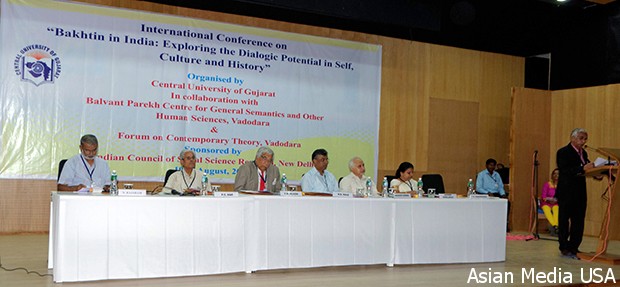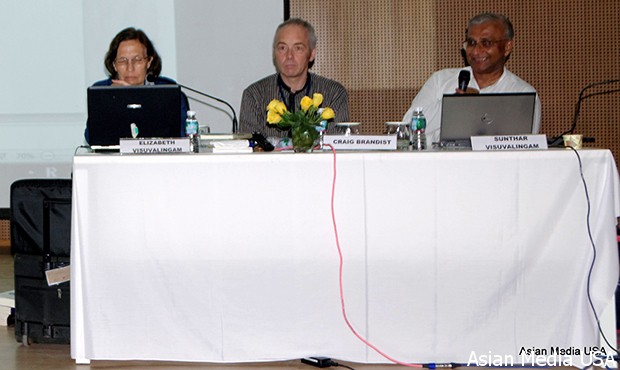Conference to Highlight Relevance of Indian Traditions to Contemporary Issues
Gandhinagar, Gujarat state (India): A successful three-day international conference on “Bakhtin in India” held at Gandhinagar, the capital of the Indian state of Gujarat, concluded on August 21, 2013, with the resolution to host a complementary follow-up conference on the relevance of Indian traditions to contemporary global issues. The conference was hosted by Prof. EV Ramakrishnan, Chairperson of the Centre for Comparative Literature and Translation Studies at the Central University of Gujarat (CUG), and was jointly organized with Prof. Prafulla Kar, who directs The Balwant Parekh Center for General Semantics and Other Human Sciences and The Forum for Contemporary Theory both based in Baroda (Vadodara, Gujarat). “Bakhtin in India” explored the relevance of the ideas of this famous Russian theorist of the last century on polyphony, dialogue, carnival, etc., towards understanding and reassessing Indian culture. Well more than a hundred, mostly Indian, scholars and enthusiastic students participated and responded to a wide range of papers.
Participants came mostly from Depts. of English and Comparative Literature keen on consolidating their understanding of this difficult, problematic, and controversial thinker. They sought to contribute something original to Bakhtinian studies by testing his models and concepts against Indian religious and secular practices both ancient and contemporary. There were also many, especially specialists of traditional knowledge systems and even Sanskritists, who had little prior exposure but were curious about his relevance. Despite some overzealous attempts to reveal “Bakhtin (already) in India” and conceptual confusions both regarding his concepts and the native cultural production to which they was being applied, there was much curiosity, open-mindedness, debate, and learning even outside the seminar halls. One young speaker went so far as to question the legitimacy of interpreting India’s eminently diverse, pluralistic, and dialogically evolving traditions through the insights of a single Western thinker.
This first-ever conference in India was the brainchild of India-born New York-based development psychologist Prof. Lakshmi Bandlamudi, who delivered the thematic introduction. She has been studying Mikhail Bakhtin for the last thirty years with the growing intuition that Indian traditions exemplified his concepts long before he appeared on the world stage. Her 2011 lecture-tour of India on a Fulbright fellowship had awakened wide interest. Bandlamudi told Asian Media USA (AMU): “The Indian participants had a good grasp of Bakhtinian concepts from his later works, while they are yet to familiarize themselves with his early works and this trend is no different from other parts of the world. Bakhtin’s early works are deeply philosophical and relatively less accessible than his later works […]. But I am confident as Bakhtin Studies pick up in India, this trend will be corrected.” Plenary speaker Prof. Craig Bandist, Director of the Bakhtin Center at Sheffield University (UK) explored possible, hitherto unacknowledged, influences by Russian Indologists on this entirely Western-oriented theorist, who wrote under Stalinist censorship.
Asian Media USA Editor Dr. Sunthar Visuvalingam delivered the keynote address on “Carnivalesque Laughter of the Great Brahmin” complemented by a plenary presentation on “The Rule of Freedom” by his French wife Dr. Elizabeth Visuvalingam. Together they “reversed the gaze” to instead show, through Bakhtin’s recurring inconsistencies, how millennial Indian festivals, exemplified by Holi and its reflection in the enigmatic brahmin clown of the Sanskrit theater, better explained the medieval European carnival. Bandist, who also moderates the international Bakhtin forum, repeatedly underlined the problems with his thought and work. He cautioned Indian scholars against taking him unquestioningly as an infallible authority. Mediated by Bandlamudi’s interrogations, this lively conference emerged at the intersection of Bakhtin and Sunthar Visuvalingam, who had not read Bakhtin’s works before being invited to deliver the keynote.
Because the lifework of the Visuvalingams on reinterpreting and re-evaluating Indian traditions and their cultural dynamics takes for its central frame of reference the writings and aesthetics of the eleventh century Kashmiri philosopher-mystic Abhinavagupta, who was brought here into direct “dialogue” with Bakhtin, the three days of debates concluded with the organizers deciding to host a wide-ranging conference late next year on “Abhinavagupta in Contemporary Theory.” During the couple’s seven-week lecture-tour of Delhi, Kolkata, Allahabad, Lucknow, Ahmedabad, and Vadodara, Sunthar had delivered lectures at universities and research centers to canvas support for such a project among both Sanskritists specializing in ancient Indian systems of thought and practice, and also specialists in ‘Western’ disciplines such as literature, psychology, sociology, and linguistic theory (semiotics). His talk on “Hindu-Muslim Relations in India as seen from Desiland Chicago” to the policy-oriented advanced research center at Allahabad University highlighted Asian Media USA’s ongoing efforts at building intercommunity trust by sympathetically covering Muslim and Pakistani religious, philanthropic, and political events. Efforts are underway to secure funding from both Indian and diaspora institutions for this planned multi-disciplinary conference and thereby create further such synergies towards shared constructive goals.
CUG Vice-Chancellor Prof R.K. Kale (formerly at JNU), who had thrown his full weight behind the conference, chaired the inaugural session, personally attended the plenaries, and discussed freely with invited speakers. CUG Chancellor YK Alagh also delivered a welcome address. The INFLIBNET (Information and Library Network) Center served as conference venue.
Photo captions for “Bakhtin in India”
#207 – Valedictory session (L to R): Profs. Lakshmi Bandlamudi, Craig Bandist, Prafulla C. Kar, and E.V. Ramakrishnan
#069 –Session 4A on “India: Politics of Dialogue” (L to R): Director of the Bakhtin Center Prof. Craig Bandist intervenes to support the sharp critique of the conference by Sunil Sagar (podium) as panelists Milan Khangamcha, K.M. Johnson, Santosh Kumar listen attentively with the rest of the audience.


